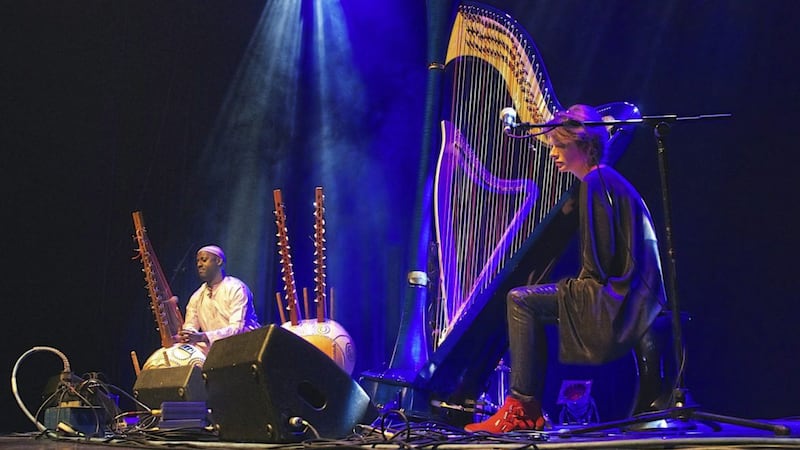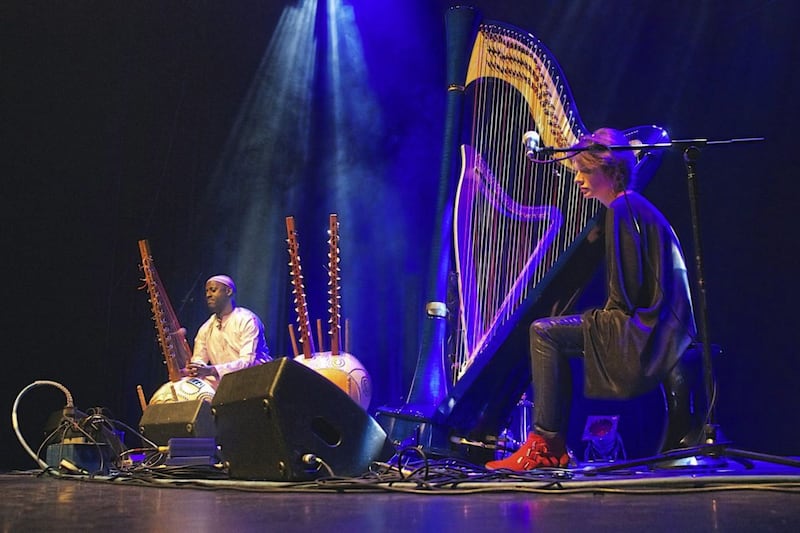IT’S spring 2013 and Catrin Finch and Seckou Keita are recording their debut album, Clychau Dibon, after playing just two concerts together. A series of initially unfortunate circumstances had unwittingly led to a most serendipitous meeting of musical talents, and a long-standing friendship and mutual respect was born.
The pair had first met the previous year in March 2012, when producers Theatr Mwldan and Astor Artes called upon Seckou to stand in when a military coup in Mali had detained kora virtuoso Toumani Diabaté and prevented him from attending rehearsals for a major collaborative tour with the young Welsh harpist Catrin Finch.
Seckou was drafted in from teaching in ltaly to help prepare the repertoire with Catrin, which he did before handing over to Toumani, who managed to arrive just hours before the first concert of the tour.
It was the first time Catrin, a classically trained harpist, had ever seen or heard a kora.
Seckou, a kora master and Senegalese griot with royal blood, didn't read music; however, the chemistry set between them, and after a successful tour with Toumani (on which Seckou was invited to guest in recognition of his contribution), it became clear that there was a potential for a future protect between Catrin and Seckou.
As the two of them continued to play together it quickly became apparent that two seeming disparate nations may in fact be closer than they first appeared.
“l’d be playing one of my pieces, and Seckou would say – 'I know that one!' It made us question whether in fact there was a deeper history there," says Catrin.
Clychau Dibon was an exploration and celebration of the harp – the national instrument of these two great musical nations. So beautifully did this music meld together, it was hard to tell where one tune ended and the next began, as Mandinka rhythms mixed and interwove seamlessly with Welsh traditional tunes.
The name? ‘Clychau' is the Welsh word for 'Bells' and the Dibon is a large bird (the Abyssinian Hornbill) which lives in the Northern tributaries of the River Niger in Guinea and the Sahel of Sub-Saharan Africa.
A romantic bird, the Dibon pairs for life, and the pairs spend the night sleeping in separate trees until early in the morning they call to find each other once again; the male using the lower notes and the female high ones.
So compelling and distinctive are the calls of the Dibon, that they have worked their ways into the rhythms of many of the local traditional hunting and farming songs, giving rise to the Mandinka rhythm 'Dibon’, and the name for the second string on the left-hand side of the kora.
Fast-forward four years, several awards and with nearly 100 concerts worldwide later and the project shows no sign of abating.
In June of 2017 Catrin and Seckou went back into the recording studio and began work on their much anticipated second album, Soar.
Soar continues the avian theme started in Clychau Dibon, highlighting another amazing connection between Wales and Senegal that has recently reestablished itself.
2011 saw the first osprey chicks to hatch in the Dyfi Valley, Mid Wales, since 1604. The moment was symbolic. Hunted to extinction in Wales during the l7th century, the ospreys had finally come home after a 400-year absence.
The opening track Clarach is named after the first Dyfi osprey in modern times to be born in Wales who subsequently returned from West Africa as an adult to rear her own chicks in the UK.
Back in the Middle Ages, Wales had a large osprey population, but by the early 17th century it was persecuted to extinction. Their ancient presence proves that migration between Senegal and Wales is nothing new.
"I like the bird's freedom to migrate to different places,” Seckou says. "They soar their way, and nothing stops them, but they know where they're heading, where they'll find peace and be happy. I've been on the same tourney, but in a different way."
Another track, Téranga Bah, touches on the importance of hospitality and welcoming strangers, Téranga means 'hospitality’ in Wolof, and Bah means 'great’ in Mandinka, both West African languages spoken by Seckou. So 'Téranga Bah' means ’great hospitality'.
"For Senegalese people, hospitality isn't just about being nice," Seckou says. "It's a BIG ritual... You'll find someone who doesn't have a penny to live on, but when a stranger arrives, they'll do anything to make them feel happy and welcome.”
Themes of colonialisation and enforced migration are explored in the track 1677, named after the year Vice-Admiral Jean ll d'Estrées stormed the Dutch fort on the Island of Gorée off the coast of Senegal, and captured it in the name of his master, Louis XlV of France.
The date marks the beginning of French rule in the region, and over the next century, Gorée was to become one of the most infamous slave trading emporia on the west coast of Africa.
“[The piece] is kind of blues sounding, dancey, but also dark,” Seckou says. "That sound, going back and forth between us, made me think about the rocking boat, about the people who could only express themselves through music, even over the waves.”
Cofiwich Dryweryn was written by Catrin to commemorate one of the defining moments in Welsh political history. The words mean 'remember Tryweryn' and they're daubed on a wall (now a protected national monument) next to the A487 between Cardigan and Aberystwyth.
The graffitti laments the flooding of the Tryweryn valley in north Wales in 1965 to create the Llyn Celyn reservoir which supplied water to the city of Liverpool. The Welsh-speaking village of Capel Celyn was abandoned to the waters, its inhabitants forced to leave their homes.
The anger felt in Wales lead to huge protests, acts of sabotage and a rise in support for Plaid Cymru and other Welsh nationalist groups.
"I wrote this piece a long time ago," Catrin says. "The Welsh language was disappearing fast. It wasn’t being taught in schools, and then this happened and fuelled everybody’s anger. It was an iconic moment.”
Drawing deep on their own diverse traditions and transforming them with remarkable synergy, Catrin and Seckou have built a formidable reputation for extraordinary performances over the past four years.
Entrancing, mesmeric, intricate and ethereal, the critically acclaimed and multi-award-winning collaboration between two adventurous virtuoso musicians delivers a stunning exhibition of world-class musicianship and a thrilling live experience.
:: Soar is available on the bendigedig label.



